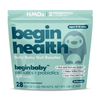5 Signs Your Baby’s Gut Needs a Boost
share this article

Is Your Baby’s Gut Off Balance?
Your baby’s gut does more than just digest milk, it plays a central role in immune development, stooling, mood, and long-term health. But sometimes, especially in the early months, a baby’s gut microbiome can become unbalanced. This can happen after C-section birth, formula feeding, antibiotics, or just everyday stressors during early development.
Here are 5 signs that may indicate your baby’s gut could use some support, plus what you can do to help strengthen and rebalance it.
1. Frequent Fussiness or Discomfort After Feeding
If your baby seems gassy, bloated, or fussy after every bottle or nursing session, it could be a sign of digestive imbalance. While some discomfort is normal during infancy, ongoing issues may point to a lack of beneficial bacteria in the gut that help break down milk sugars and reduce gas.
Look for gentle microbiome support like Beginbaby Prebiotic + Probiotic, which contains 2’-FL HMO and B. infantis to promote smoother digestion and comfort.
2. Inconsistent or Hard-to-Pass Stools
Babies should poop regularly, and the texture should be soft—especially in the first few months. If your baby is going days without pooping, straining, or passing hard stools, their gut motility may need support.
Prebiotics like HMOs and chicory root fiber help soften stool and promote regularity by feeding good bacteria and improving gut motility.
3. Recent Use of Antibiotics (Mom or Baby)
Antibiotics are sometimes necessary, but they don’t discriminate, meaning they wipe out both harmful and helpful bacteria. If you or your baby had antibiotics during pregnancy, delivery, or early infancy, it could leave their microbiome depleted.
Replenish your baby’s gut with targeted infant probiotics, such as Bifidobacterium infantis and B. lactis, which are among the most important strains for building a resilient infant gut.
4. Eczema, Allergies, or Frequent Infections
Emerging research shows that immune conditions like eczema and allergies are often tied to imbalances in the gut microbiome. A lower presence of Bifidobacteria in infancy has been linked to higher risks of atopic conditions and immune dysregulation [1].
Building up healthy gut bacteria in early life may support immune tolerance and reduce the risk of inflammatory responses.
5. Born via C-Section or Formula-Fed
Vaginal birth and breastfeeding naturally help “seed” your baby’s gut with beneficial bacteria like Bifidobacterium infantis. If your baby was born by C-section or formula-fed, they may have missed out on some of that initial seeding.
Consider microbiome-nourishing formulas or adding a daily prebiotic + probiotic supplement designed specifically for infants to help mimic some of the benefits of breast milk.
Summary
Your baby’s gut health lays the foundation for their digestion, immune system, and even mood. Signs like hard stools, fussiness, antibiotic exposure, or formula feeding may indicate that their gut needs a little extra support. The good news? With the help of infant-friendly prebiotics and probiotics, like those in Beginbaby Prebiotic + Probiotic, you can gently nurture a healthier, more balanced gut during early infancy.
















